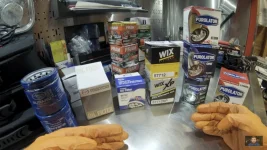I'm not sure I buy that distinction. The OE in both of those abbreviations stands for Original Equipment, and if the engine is not originally equipped with that filter, then calling it any name that includes the words Original Equipment is logically wrong.The filter that came on the engine from the factory (made by whoever Ford contracts) would be an OES part. The "Motorcraft" branded filter, even though made by Purolator, would be an OEM part. A filter branded "Fram", "Wix", "Purolator", etc would be an aftermarket part.
https://www.yourmechanic.com/articl...-oem-and-aftermarket-car-parts-by-conor-fynes
As for the other thing, following it to its logical outcome, we'd conclude that Purolator could make two identical filters, label one Purolator and the other Motorcraft, and we'd be rigidly obliged to call one aftermarket and the other OEM. That's silly if you think about it. It's the same filter, so if it can be called one, it can be called the other.
The corporations involved may have reasons for wanting to promulgate this kind of doublespeak, but we're not obliged to go along with it when it departs from logic.

